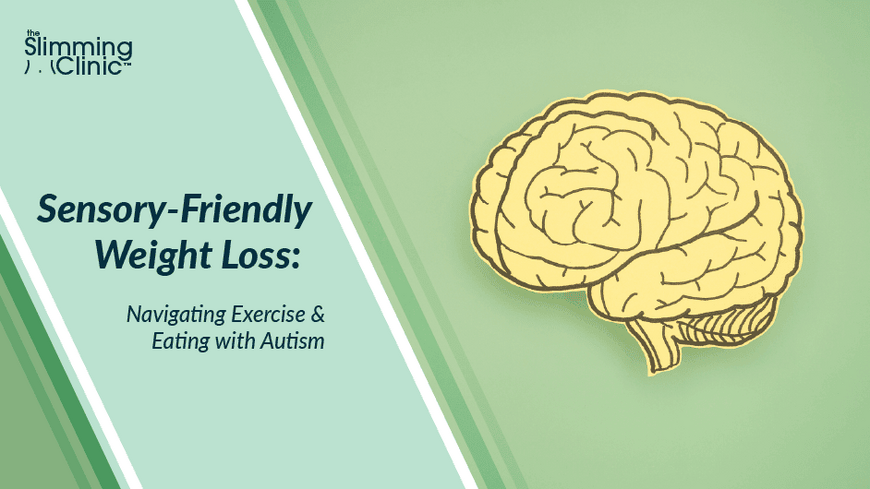Sensory-Friendly Weight Loss: Navigating Exercise & Eating with Autism
Losing Weight with Autism: A Sensory-Friendly Approach
Losing weight with autism comes with unique challenges. Many neurodivergent individuals experience sensory sensitivities that affect their diet and ability to engage in traditional exercise routines. Textures, temperatures, and environments that others might not notice can be overwhelming, making it difficult to follow standard weight-loss advice. However, a sensory-friendly approach to eating and movement can make the process more accessible, sustainable, and comfortable.
This blog explores how to navigate weight management in a way that respects sensory preferences, providing strategies for both eating and exercise that support a healthier lifestyle without unnecessary stress.
Understanding Weight Management & Autism
Autism can influence weight in various ways, from selective eating habits to difficulties in establishing new routines. Studies show that autistic individuals are at a higher risk of both obesity and undernutrition due to food aversions, routine-driven eating patterns, and challenges with physical activity. Visit the Autism speaks site to learn more about weight management for Autism.
For many, the key to successful weight loss is not simply cutting calories or increasing activity but finding sustainable, comfortable changes that fit within their sensory needs and routines. This means identifying foods and exercises that feel good, rather than forcing discomfort in the name of weight loss.
Sensory-Friendly Eating for Weight Loss
Sensory sensitivities often impact diet choices, with some individuals struggling with certain textures, strong flavours, or the way food is presented. While this can make weight management difficult, small adaptations can help build a balanced, nutritious diet that aligns with sensory preferences.
Tips for Sensory-Friendly Eating:
- Explore Alternative Textures - If certain foods are unappealing due to texture, find suitable swaps. For example, if crunchy vegetables are difficult, try blending them into soups or sauces. Explore more here.
- Adjust Food Temperature - Some individuals prefer foods at room temperature to avoid extreme hot or cold sensations. Experimenting with food temperatures can make meals more comfortable.
- Introduce New Foods Gradually - Instead of sudden changes, introduce small portions of new foods alongside familiar favourites to slowly build tolerance.
- Stick to a Routine - Eating at the same times daily can help regulate hunger cues and make mealtimes feel predictable and less stressful.
By making these adjustments, it becomes easier to incorporate more nutrient-dense foods into daily life without triggering discomfort.
Exercise & Movement for Neurodivergent Individuals
Traditional workout environments, such as noisy gyms or crowded classes, can be overwhelming for autistic individuals. Finding movement that aligns with sensory needs can make physical activity more enjoyable and sustainable.
Sensory-Friendly Exercise Options:
- Swimming - The pressure of water provides a calming sensory experience while offering full-body exercise.
- Home Workouts - Exercising at home removes external distractions, allowing movement at a comfortable pace.
- Yoga & Stretching - Gentle, self-paced movements in a quiet environment can be beneficial for both fitness and relaxation.
- Weighted Exercises - Strength training with light weights can provide proprioceptive input, which some autistic individuals find grounding and regulating.
By focusing on movement that feels good, rather than forcing traditional exercise routines, individuals can create a more sustainable, enjoyable approach to staying active.
Balancing Weight Loss & Well-being
Losing weight with autism should always prioritise overall well-being. Sensory-friendly weight management isn’t about rigid dieting or intense exercise but about finding strategies that work for the individual.
For some, medical weight loss options, such as prescription treatments, may be beneficial when used alongside healthy eating and movement. Consulting with healthcare professionals familiar with neurodivergence can help create a personalised plan that takes both medical and sensory needs into account. Learn more about weight management for Autistic individuals here.
Seeking Professional Guidance
Since every autistic individual has unique sensory preferences, working with autism-informed dieticians, fitness professionals, or medical experts can provide tailored support. Resources on autism and nutrition, as well as adaptive exercise programs, can also offer valuable guidance. Get in touch with our GMC-registered doctors for more guidance and advice about your weight loss journey here.
Creating a Sensory-Friendly Approach to Weight Loss
Achieving and maintaining a healthy weight with autism is a deeply personal journey that should be guided by comfort, consistency, and individual preferences. Sensory-friendly eating and movement strategies help make weight management more approachable, reducing stress and increasing long-term sustainability.
By making small, gradual changes, such as adjusting food textures, finding enjoyable ways to move, and seeking support from knowledgeable professionals, autistic individuals can develop a balanced approach to health that aligns with their unique needs.
Ultimately, success in weight management isn’t about rigid rules but about discovering what works best for you and embracing changes that feel both comfortable and achievable. With autism requires an approach that prioritises comfort, consistency, and individual needs. By embracing sensory-friendly eating strategies and movement options, weight loss can become a more achievable and less stressful process. Small, sustainable changes, whether adjusting food textures, finding enjoyable movement, or seeking expert advice, can lead to meaningful improvements in health and well-being.
If you're navigating weight loss with autism, remember that the right approach is the one that works for you.
Looking to start your weight loss journey, then take action today!
Book an appointment with one of our GMC-Registered Doctors who are weight loss experts and can ensure you get the best programme for you. Alternatively request your medication online using our online prescription service.








